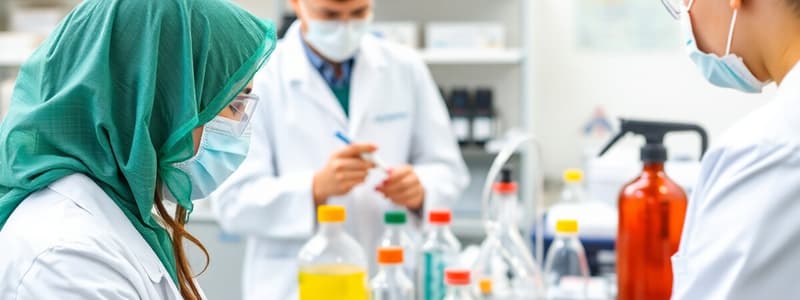Podcast
Questions and Answers
Eating while conducting an experiment in the lab is allowed.
Eating while conducting an experiment in the lab is allowed.
False (B)
It is suggested that you wear contact lenses rather than glasses while conducting experiments.
It is suggested that you wear contact lenses rather than glasses while conducting experiments.
False (B)
Always wear safety goggles to protect your eyes from chemical splashes during experiments.
Always wear safety goggles to protect your eyes from chemical splashes during experiments.
True (A)
Long hair should be tied back to prevent it from catching fire or interfering with experiments.
Long hair should be tied back to prevent it from catching fire or interfering with experiments.
You should notify your teacher or parents if any spills or accidents occur during an investigation.
You should notify your teacher or parents if any spills or accidents occur during an investigation.
It is safe to reach across an open flame while conducting an experiment.
It is safe to reach across an open flame while conducting an experiment.
Keeping your work area uncluttered is an important safety practice in the laboratory.
Keeping your work area uncluttered is an important safety practice in the laboratory.
Rolling up loose sleeves is unnecessary when conducting experiments.
Rolling up loose sleeves is unnecessary when conducting experiments.
Tongs and protective gloves should be used to handle hot objects in the lab.
Tongs and protective gloves should be used to handle hot objects in the lab.
It is acceptable to put anything into your mouth during a lab experiment.
It is acceptable to put anything into your mouth during a lab experiment.
Flashcards
Lab Safety
Lab Safety
Procedures and rules to prevent accidents and injuries in a lab setting.
Safety Goggles
Safety Goggles
Protective eyewear worn to shield eyes from chemical splashes, heat, or broken objects.
Eating in Lab
Eating in Lab
Eating food in the lab is prohibited, as it may contaminate experiments.
Uncluttered Work Area
Uncluttered Work Area
Signup and view all the flashcards
Fire Safety
Fire Safety
Signup and view all the flashcards
Chemical Handling
Chemical Handling
Signup and view all the flashcards
Heating Safety
Heating Safety
Signup and view all the flashcards
Equipment Location
Equipment Location
Signup and view all the flashcards
Listen to Instructions
Listen to Instructions
Signup and view all the flashcards
No Mouth-related Activities
No Mouth-related Activities
Signup and view all the flashcards
Study Notes
Safety in Conducting Investigations
- Workplan: The lesson follows a four-part workplan: routines, activity, interactive discussion, and wrap-up.
- Essential Question: What are the benefits of following safety tips in conducting investigations or experimentation?
- Lab Safety Tips (Examples): List at least three safety tips in the laboratory.
- Unsafe Activities (Illustration): The illustration depicts unsafe activities like eating in the lab or improper handling of equipment.
- Protective Gear: A helmet and hand gloves are examples of protective gear. Eating in the lab is not allowed.
General Safety Rules
- Instructions: Listen to or read instructions carefully before attempting any activity.
- Eye Protection: Wear safety goggles to protect eyes from chemicals, heated materials, or breakable substances.
- Accidents/Spills: Notify your teacher/parents immediately if any spills or accidents occur.
- Hand Washing: Always wash hands with soap and water after handling chemicals.
- Hands Away from Face: Keep hands away from the face during investigations.
- Loose Sleeves: Roll up loose sleeves.
- Workplace Organization: Keep the work area uncluttered. Take only necessary materials to the experiment station.
- Location of Safety Equipment: Know the location of the fire extinguisher, fire blanket, and first-aid kit.
Heating Safety
- Handling Hot Objects: Use tongs and/or protective gloves when handling hot objects.
- Reaching Across Flames: Never reach across an open flame or burner.
- Test Tube Placement: Always point the top ends of test tubes away from people when heating.
- Even Heating: Move the test tube around slowly over the flame to ensure even heating.
- Dry Glassware: Only use thoroughly dry glassware for heating.
- Heating Platform: Heat glassware by placing it on a wire gauze platform on a ring stand, not holding it by hand.
First Aid
- Burns: Immediately flush burns with cold water until the burning sensation lessens.
- Cuts/Bruises: Do not touch open wounds without safety gloves. Minor cuts can stop bleeding with direct pressure. Apply cold compress for bruises/swelling.
- Eye Injuries: Flush eyes immediately with plenty of water for several minutes. If a foreign object is lodged in the eye, do not rub the eye.
Additional Notes/Questions
- Essential Question (follow-up): What are the benefits of following safety tips when conducting an investigation or experimentation?
- Discussion Topics (Suggested): The lesson includes prompts for interactive discussion and brainstorming on further protective gear and unsafe lab behavior to highlight.
Studying That Suits You
Use AI to generate personalized quizzes and flashcards to suit your learning preferences.
Related Documents
Description
Test your knowledge on essential safety measures when conducting investigations in the laboratory. This quiz covers safety tips, protective gear, and general laboratory rules. Understand the importance of following safety protocols to ensure a secure environment during experiments.



